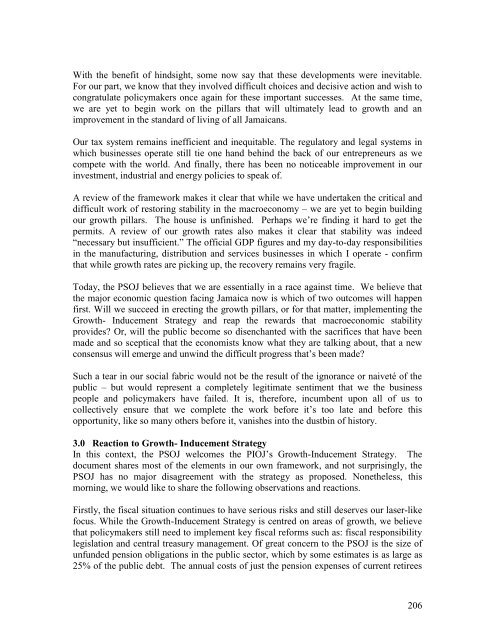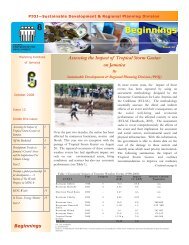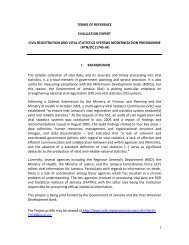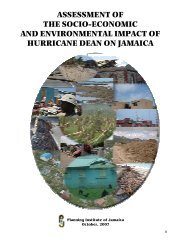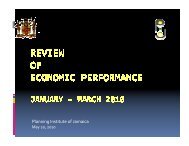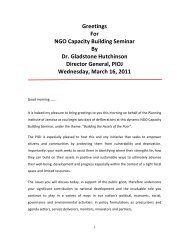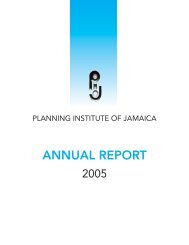PIOJ Growth-Inducement Strategy - Planning Institute of Jamaica
PIOJ Growth-Inducement Strategy - Planning Institute of Jamaica
PIOJ Growth-Inducement Strategy - Planning Institute of Jamaica
Create successful ePaper yourself
Turn your PDF publications into a flip-book with our unique Google optimized e-Paper software.
With the benefit <strong>of</strong> hindsight, some now say that these developments were inevitable.<br />
For our part, we know that they involved difficult choices and decisive action and wish to<br />
congratulate policymakers once again for these important successes. At the same time,<br />
we are yet to begin work on the pillars that will ultimately lead to growth and an<br />
improvement in the standard <strong>of</strong> living <strong>of</strong> all <strong>Jamaica</strong>ns.<br />
Our tax system remains inefficient and inequitable. The regulatory and legal systems in<br />
which businesses operate still tie one hand behind the back <strong>of</strong> our entrepreneurs as we<br />
compete with the world. And finally, there has been no noticeable improvement in our<br />
investment, industrial and energy policies to speak <strong>of</strong>.<br />
A review <strong>of</strong> the framework makes it clear that while we have undertaken the critical and<br />
difficult work <strong>of</strong> restoring stability in the macroeconomy – we are yet to begin building<br />
our growth pillars. The house is unfinished. Perhaps we’re finding it hard to get the<br />
permits. A review <strong>of</strong> our growth rates also makes it clear that stability was indeed<br />
“necessary but insufficient.” The <strong>of</strong>ficial GDP figures and my day-to-day responsibilities<br />
in the manufacturing, distribution and services businesses in which I operate - confirm<br />
that while growth rates are picking up, the recovery remains very fragile.<br />
Today, the PSOJ believes that we are essentially in a race against time. We believe that<br />
the major economic question facing <strong>Jamaica</strong> now is which <strong>of</strong> two outcomes will happen<br />
first. Will we succeed in erecting the growth pillars, or for that matter, implementing the<br />
<strong>Growth</strong>- <strong>Inducement</strong> <strong>Strategy</strong> and reap the rewards that macroeconomic stability<br />
provides? Or, will the public become so disenchanted with the sacrifices that have been<br />
made and so sceptical that the economists know what they are talking about, that a new<br />
consensus will emerge and unwind the difficult progress that’s been made?<br />
Such a tear in our social fabric would not be the result <strong>of</strong> the ignorance or naiveté <strong>of</strong> the<br />
public – but would represent a completely legitimate sentiment that we the business<br />
people and policymakers have failed. It is, therefore, incumbent upon all <strong>of</strong> us to<br />
collectively ensure that we complete the work before it’s too late and before this<br />
opportunity, like so many others before it, vanishes into the dustbin <strong>of</strong> history.<br />
3.0 Reaction to <strong>Growth</strong>- <strong>Inducement</strong> <strong>Strategy</strong><br />
In this context, the PSOJ welcomes the <strong>PIOJ</strong>’s <strong>Growth</strong>-<strong>Inducement</strong> <strong>Strategy</strong>. The<br />
document shares most <strong>of</strong> the elements in our own framework, and not surprisingly, the<br />
PSOJ has no major disagreement with the strategy as proposed. Nonetheless, this<br />
morning, we would like to share the following observations and reactions.<br />
Firstly, the fiscal situation continues to have serious risks and still deserves our laser-like<br />
focus. While the <strong>Growth</strong>-<strong>Inducement</strong> <strong>Strategy</strong> is centred on areas <strong>of</strong> growth, we believe<br />
that policymakers still need to implement key fiscal reforms such as: fiscal responsibility<br />
legislation and central treasury management. Of great concern to the PSOJ is the size <strong>of</strong><br />
unfunded pension obligations in the public sector, which by some estimates is as large as<br />
25% <strong>of</strong> the public debt. The annual costs <strong>of</strong> just the pension expenses <strong>of</strong> current retirees<br />
206


